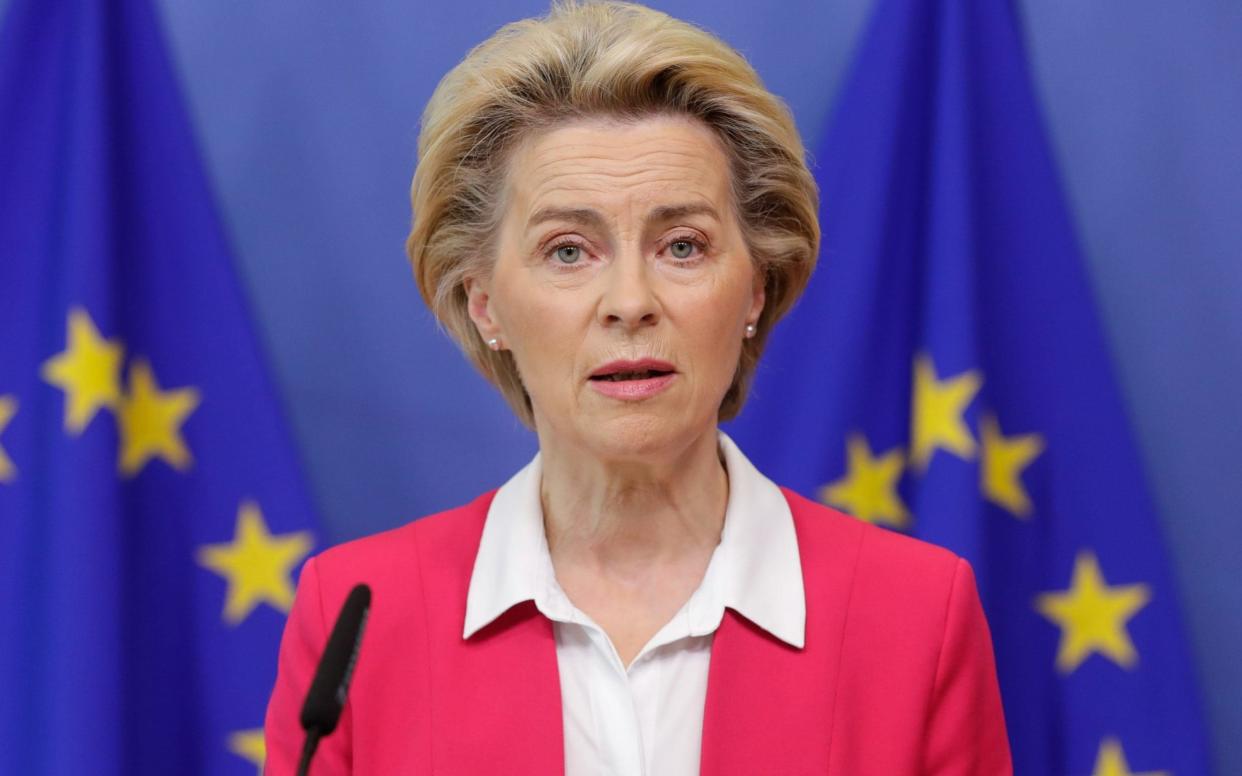German politicians and media turn on 'careless' Ursula von der Leyen over Covid vaccine fiasco

- Oops!Something went wrong.Please try again later.
Ursula von der Leyen was facing German anger at her handling of European Union vaccine orders on Friday.
There is indignation and dismay across the European Union at a debacle that has left the bloc facing severe shortages.
But while most member states supported the European Commission in its war of words with AstraZeneca, politicians and newspapers in her native Germany began to point the finger of blame squarely at Mrs von der Leyen.
“Vaccination is our only way out of the crisis, it has to be a leader’s responsibility. I'm really stunned by how carelessly Ursula von der Leyen has looked after the start of the vaccination over the past few months,” said Carsten Schneider of the centre-Left Social Democrats (SPD).
“With all the procurement chaos and the mistakes that have been made, the commission president can no longer duck the issue.”
The party chairman of Angela Merkel’s main coalition partner, Mr Schneider is not someone Mrs von der Leyen can afford to ignore.
Bild, Germany’s highest-selling newspaper, joined the criticism of Mrs von der Leyen, demanding to know why the EU has been left behind the UK, US and Israel in the vaccination race.
Noting Mrs von der Leyen had refused its request for an interview, Bild published its questions for her, including “Why did it take so long to agree contracts?” and “Why were no specific delivery dates agreed?”
Mrs von der Leyen has long been a controversial figure in Germany. While her appointment as European Commission president last year was seen internationally as a triumph for Germany, domestically it was viewed as rather more of a mixed blessing.
“It brings back memories of her leadership style at the defence ministry,” Mr Kilingbeil said on Friday. Mrs von der Leyen’s tenure as defence minister saw the armed forces so starved of funding that German troops taking part in a Nato exercise had to use broomsticks instead of guns. But she chose to focus instead on initiatives such as creches for soldiers.
“Instead of backroom politics and a lack of transparency, what we now need from the EU is clarity,” Mr Klingbeil said “All the facts and contracts with the vaccine manufacturers must be put on the table. We cannot be satisfied that Europe is lagging so far behind.”
In Brussels, the European Commission tried to calm the war of words. “Transparency is needed, not a vaccine war,” Didier Renders, Belgium's EU commissioner, said.
“Britain may want to start a vaccine war, but we have a programme of vaccines for European countries and our partners.”
But around the continent tempers frayed. “EU on the counter-attack, the chaos over vaccines breaks out into open war," said Italy's La Stampa daily.
The rival Corriere della Sera reported the British press was “on a war footing, accusing the EU of wanting to steal vaccines from Britain”.
I had hoped not to see 🇪🇺 leading the world down the destructive path of vaccine nationalism. Our continent’s entire history of success has been one of open global value chains.
— Carl Bildt (@carlbildt) January 29, 2021
Carl Bildt, former Swedish prime minister and co-chair of the European Council on Foreign Relations, tweeted: "I had hoped not to see [the EU] leading the world down the destructive path of vaccine nationalism. Our continent’s entire history of success has been one of open global value chains."
Spain’s deputy prime minister waded into the row, placing the blame firmly on AstraZeneca and describing it was an example of multinational companies wielding too much power.
“We are seeing that multinationals and pharmaceutical companies are not complying with their deadlines and commitments,” Pablo Iglesias of the hard-Left Podemos party said. “They are not only putting people's health and lives at risk, but also the economic recovery of countries.”
The Dutch prime minister, Mark Rutte said he regretted the slow start to vaccinations, but added he was more concerned about shortages that have left the Netherlands with only enough vaccine for 2 to 3 per cent of the population.
“What then? We still have 70 to 90 per cent to go and you need vaccine for that. And the numbers so far have been going backwards more than forward, it seems,” he said.
One country that came up with an alternative solution to the problem was Hungary, which became the first EU member to approve the Chinese vaccine, agreeing a deal for 5 million doses.
The move comes just a week after Hungary was the first EU member to buy the Russian vaccine.
Viktor Orban, the Hungarian prime minister, said he would personally choose to be given the Chinese vaccine, as he trusts it more than any of the others.

